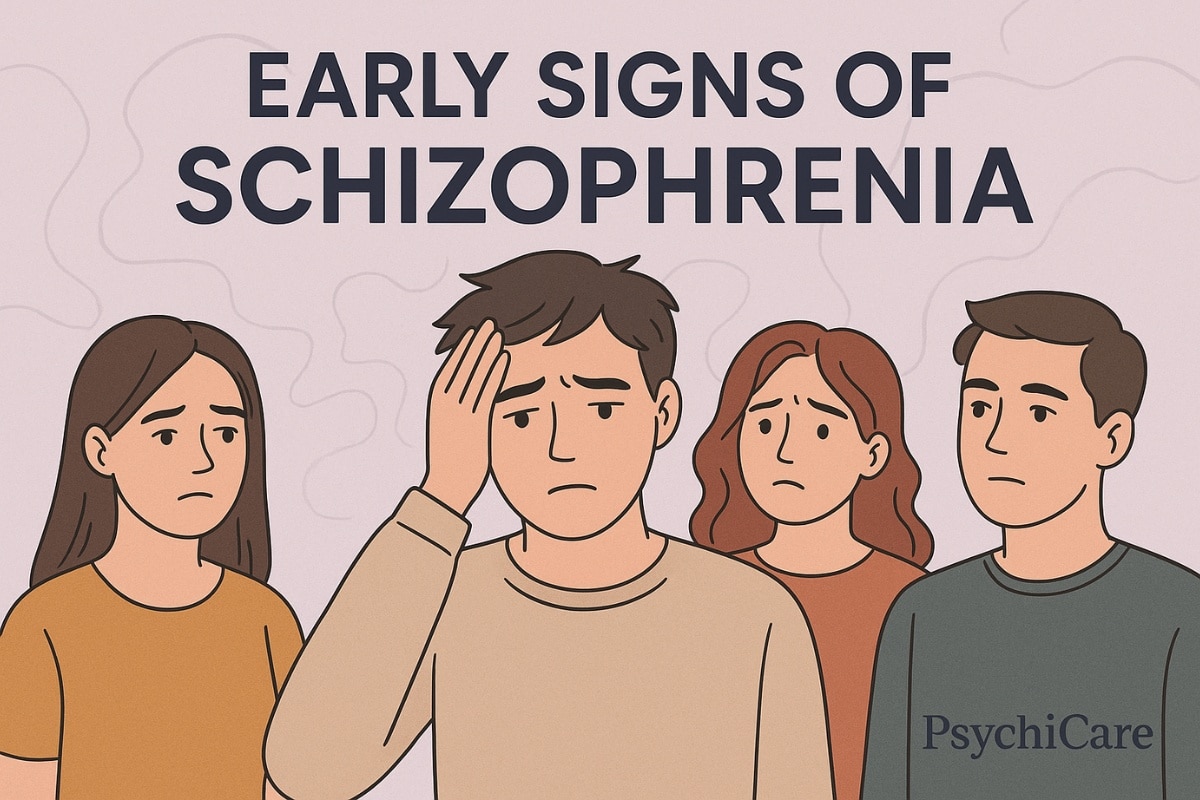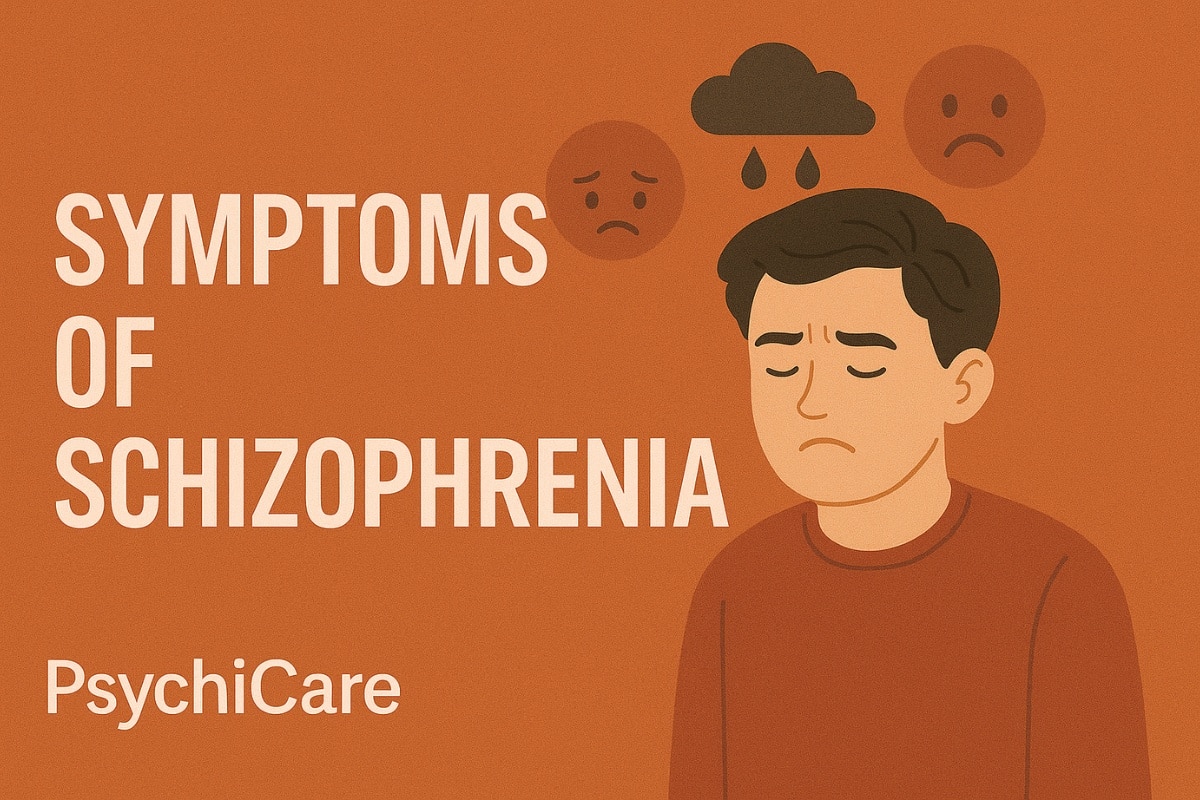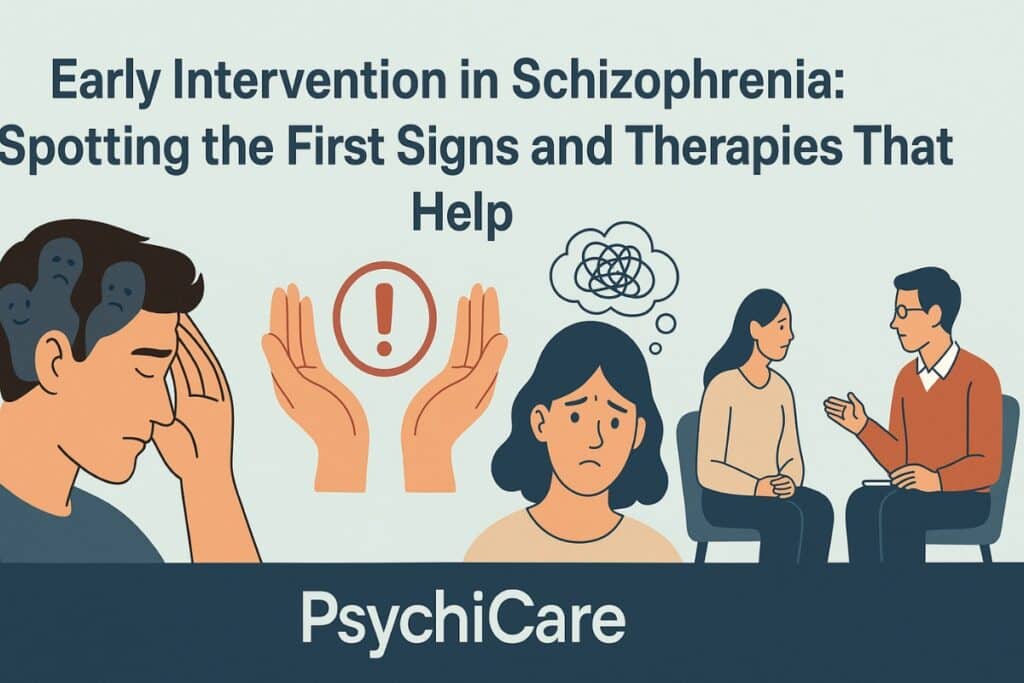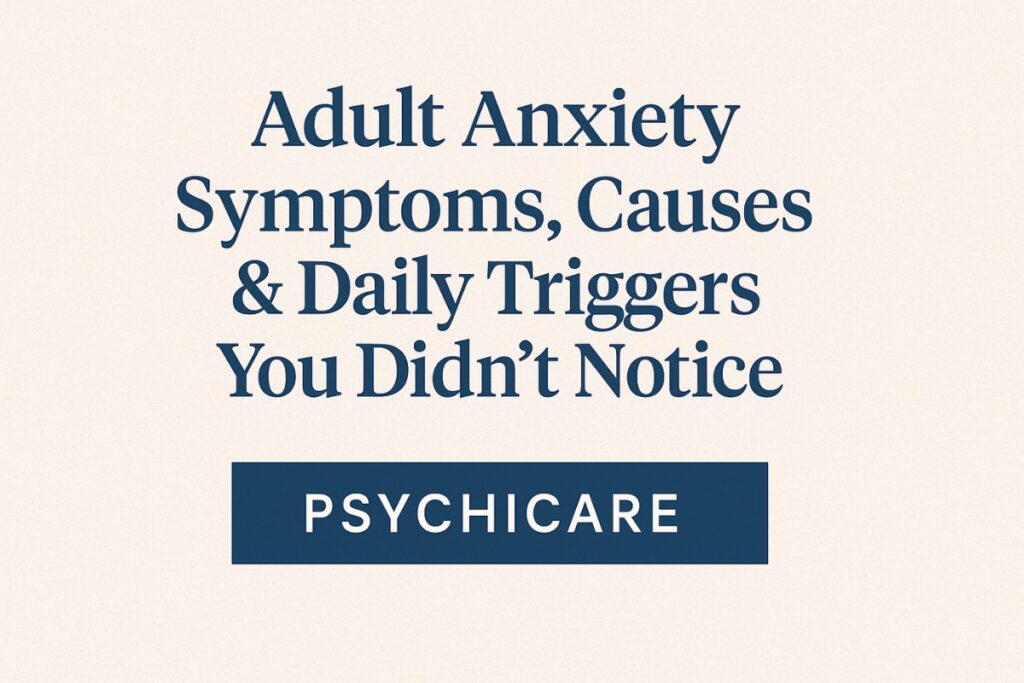Updated: October 2025 · Content reviewed and improved for clarity and accuracy.
Schizophrenia doesn’t usually appear overnight.
It often starts with small, confusing changes, trouble focusing, withdrawing from friends, or saying unusual things.
The condition affects about 24 million people worldwide (WHO), usually starting in the late teens or early 20s.
Getting help early can reduce hospital stays, protect relationships, and improve long-term recovery.
This guide explains the first warning signs and the therapies that make a real difference.
What Does Early Intervention Really Mean?
Early intervention means getting treatment as soon as symptoms appear.
It’s not waiting years until the illness becomes severe.
It includes quick access to doctors, therapy, and family support.
Studies show that people treated within the first year do far better than those who wait.
They are more likely to finish school, hold a job, and live independently.
For families, it means not dismissing early warning signs as “just stress” or “teen behavior.”
The sooner help starts, the more hopeful the recovery path can be.
Early Signs of Schizophrenia
Schizophrenia often begins with small changes in daily life.

- At home: avoiding family meals, staying in their room all day.
- At school or work: sudden drop in grades, skipping classes, missing deadlines.
- In conversations: speaking less, saying odd or unrealistic things.
- Emotionally: mood swings, showing little or no facial expression.
- Perceptions: hearing whispers, believing the TV or internet is sending messages.
Real stories often sound like this:
“I thought my parents were plotting against me.”
“My friend stopped talking to everyone and laughed to himself for hours.”
These signs usually appear in the late teens or early 20s, but can sometimes show up in children or later in life.
When Does Schizophrenia Usually Start?
- Most people develop symptoms in their late teens or early 20s.
- Men often show signs a little earlier than women.
- In rare cases, children may develop schizophrenia (childhood-onset).
- Some people first experience it later in life, often confused with dementia.
- According to the WHO, schizophrenia affects about 1 in 300 people worldwide.
Early signs may look like normal teenage struggles, mood swings, isolation, or slipping grades.
But when these changes are intense and ongoing, it’s a signal to seek help quickly.
Symptoms of Schizophrenia
Schizophrenia symptoms are usually grouped into three main categories.

- Positive Symptoms (things added to experience)
- Hearing voices or seeing things others don’t.
- Strong beliefs that aren’t true (delusions).
- Disorganized speech or behavior.
- Hearing voices or seeing things others don’t.
- Negative Symptoms (things taken away from normal life)
- Lack of motivation or interest.
- Flat facial expression, little emotion.
- Withdrawal from family, friends, or work.
- Lack of motivation or interest.
- Cognitive Symptoms (thinking and memory problems)
- Trouble focusing on tasks.
- Poor short-term memory.
- Difficulty following conversations or learning new things.
- Trouble focusing on tasks.
In real life, families often notice early shifts, a student suddenly failing in school, a friend avoiding everyone, or a loved one talking about voices only they can hear.
📊 Quick Stats
- Schizophrenia affects about 24 million people worldwide (WHO).
- That’s roughly 1 in every 300 people.
- Most cases begin between the ages of 16–30.
Why Acting Early Matters
- The longer symptoms go untreated, the harder recovery becomes.
- Without help, people may drop out of school, lose jobs, or cut off family and friends.
- Early treatment reduces the risk of repeated hospital stays.
- Research shows that people who get help in the first year of symptoms have far better outcomes.
- Families often say, “We thought it was just stress, and we waited too long.”
- Acting early gives a better chance to live independently, build relationships, and return to normal routines.
Therapies That Help – Online with PsychiCare
Early treatment works best when therapy is consistent and accessible. With PsychiCare’s online services, people can connect with licensed psychologists and psychiatrists from home, no waiting rooms, no travel, just direct support when it’s needed most.
Here are the therapies we provide online:
- Cognitive Behavioral Therapy (CBT)
- Helps people manage voices, suspicious thoughts, and anxiety.
- Teaches coping skills to handle stress and daily challenges.
- Helps people manage voices, suspicious thoughts, and anxiety.
- Family Therapy
- Guides parents, partners, and siblings on how to support without conflict.
- Reduces blame and tension at home, creating a safer space for recovery.
- Guides parents, partners, and siblings on how to support without conflict.
- Supportive Counseling
- One-on-one sessions where clients can talk openly about fears and emotions.
- Builds trust, motivation, and emotional strength over time.
- One-on-one sessions where clients can talk openly about fears and emotions.
- Psychoeducation
- Provides families and clients with simple information about schizophrenia.
- Helps everyone understand what is happening and how treatment works.
- Provides families and clients with simple information about schizophrenia.
- Medication Management (with partner psychiatrists)
- When medication is needed, PsychiCare’s network connects clients with psychiatrists online for reviews and adjustments.
- Regular follow-ups ensure safety and effectiveness.
- When medication is needed, PsychiCare’s network connects clients with psychiatrists online for reviews and adjustments.
- Ongoing Progress Check-ins
- Therapists stay connected with families and clients to track progress.
- Early changes are spotted quickly, preventing crises.
- Therapists stay connected with families and clients to track progress.
👉 At PsychiCare, our team has 15–20 years of experience in schizophrenia care. Online therapy means families don’t have to wait months for appointments support is available when warning signs first appear.
Final Thoughts
Schizophrenia can feel overwhelming, especially when the first signs appear in someone you love. But the truth is, early help changes everything. The sooner therapy starts, the greater the chance of managing symptoms, protecting relationships, and building a stable future.
At PsychiCare, we believe no one should have to face this journey alone. With our team of licensed psychologists and psychiatrists offering online therapy, family support, and ongoing care, help is just a click away.
Recovery doesn’t mean life without challenges; it means learning to live well with support, strength, and hope. And with the right care, it’s possible.
FAQs on Schizophrenia and Early Intervention
Q1. What are the first signs of schizophrenia?
The first signs of schizophrenia often include withdrawal from friends, mood swings, confused speech, and unusual beliefs. Some people may also hear voices or laugh to themselves.
Q2. At what age does schizophrenia start?
Schizophrenia usually starts in the late teens or early 20s. Men often show signs a bit earlier than women, while rare cases can appear in children or later in life.
Q3. Is schizophrenia genetic?
Schizophrenia is partly genetic. Having a close family member with the illness raises the risk, but environment and stress also play a role.
Q4. Can schizophrenia be cured?
Schizophrenia cannot be fully cured, but it can be managed. With therapy, medication, and support, many people live meaningful and independent lives.
Q5. What are the negative symptoms of schizophrenia?
Negative symptoms of schizophrenia include lack of motivation, flat facial expressions, social withdrawal, and reduced speech. These are harder to treat than hallucinations or delusions.
Q6. What are the positive symptoms of schizophrenia?
Positive symptoms of schizophrenia are hallucinations, delusions, and disorganized speech or behavior. These symptoms add experiences that are not real.
Q7. What is paranoid schizophrenia?
Paranoid schizophrenia is a type once used to describe cases where paranoia and delusions were the main symptoms. Today, doctors use the term schizophrenia spectrum disorder instead.
Q8. What is catatonic schizophrenia?
Catatonic schizophrenia describes when a person becomes very still, resists movement, or repeats actions. It is rare today but still seen as part of the schizophrenia spectrum.
Q9. What therapies help schizophrenia?
Therapies for schizophrenia include Cognitive Behavioral Therapy (CBT), family therapy, supportive counseling, and psychoeducation. Online therapy platforms like PsychiCare make these accessible from home.
Q10. What is the newest treatment for schizophrenia?
The newest treatment for schizophrenia is KarXT, an FDA-approved medication that shows promise with fewer side effects. Research is also exploring brain-based and lifestyle approaches.




